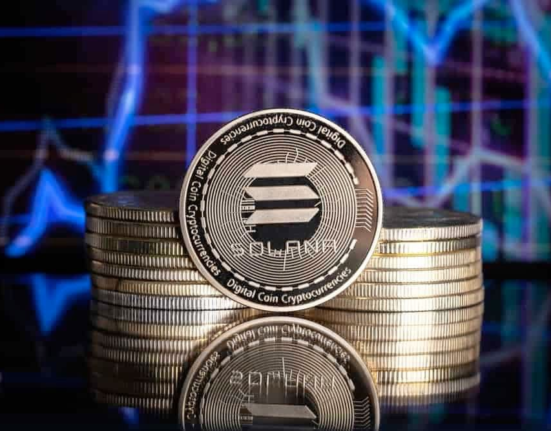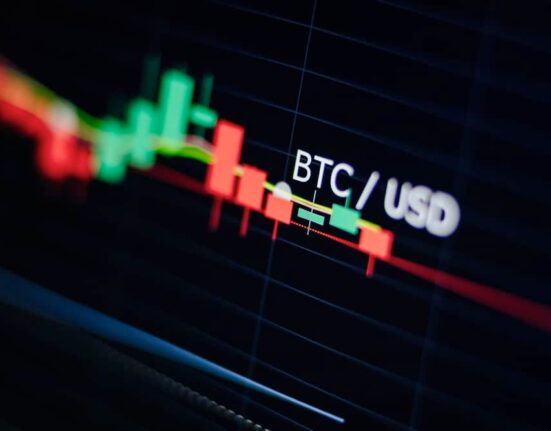Uniswap is the largest decentralized exchange (or DEX) operating on the Ethereum blockchain. It allows users anywhere in the world to trade crypto without an intermediary. UNI, the governance token that allows users to vote on key protocol changes, is the fourth largest cryptocurrency by market cap on Coinbase as of April 2021 — with a total value of more than $18 billion.
was one of the first decentralized finance (or DeFi) applications to gain significant traction on Ethereum — launching in November 2018. Since then, numerous other decentralized exchanges have launched (including Curve, SushiSwap, and Balancer), but Uniswap is currently the most popular by a significant margin. As of April 2021, had processed over $10 billion in weekly trading volume.
pioneered the Automated Market Maker model, in which users supply Ethereum tokens to Uniswap “liquidity pools” and algorithms set market prices (as opposed to order books, which match bids and asks on a centralized exchange like Coinbase) based on supply and demand.
By supplying tokens to liquidity pools, users can earn rewards while enabling peer-to-peer trading. Anyone, anywhere, can supply tokens to liquidity pools, trade tokens, or even create and list their own tokens (using Ethereum’s ERC-20 protocol). There are currently hundreds of tokens available on , and some of the most popular trading pairs are stablecoins like USDC and Wrapped Bitcoin (WBTC).
Some of the potential advantages of decentralized exchanges like Uniswap include:
- Safe: Funds are never transferred to any third party or generally subject to counterparty risk (i.e. trusting your assets with a custodian) because both parties are trading directly from their own wallets.
- Global and permissionless: There is no concept of borders, or restrictions on who can trade. Anyone with a smartphone and an internet connection can participate.
- Ease of use and pseudonymous: No account signup or personal details are required.
How Does Uniswap Work ?
Uniswap is a decentralized exchange (DEX) built on the Ethereum blockchain. Unlike centralized exchanges (CEXs) like Binance or Coinbase, doesn’t rely on a middleman to facilitate cryptocurrency trades. Here’s a breakdown of how Uniswap functions:
Automated Market Making (AMM):
- Uniswap utilizes an AMM model, eliminating the need for order books (traditional method matching buy and sell orders).
- Instead, Uniswap relies on liquidity pools. These are smart contract-managed pools of cryptocurrencies where users deposit equal values of two tokens (e.g., ETH and USDT).
- Users supplying liquidity become liquidity providers (LPs) and earn fees based on trading activity in that pool.
Swapping Tokens:
- When a user wants to swap one token for another on Uniswap, they interact with a liquidity pool.
- The swap doesn’t directly involve another user; instead, it alters the ratio of tokens within the pool according to a mathematical formula.
- This formula helps maintain a fair price for both tokens in the pool.
Benefits of Uniswap:
- Decentralization: No central authority controls Uniswap, promoting censorship resistance and user autonomy.
- Transparency: Smart contracts governing liquidity pools are publicly auditable on the Ethereum blockchain.
- Permissionless: Anyone can contribute liquidity or swap tokens on Uniswap without restrictions (within gas fee limitations).
- Wide Range of Tokens: Uniswap supports a vast variety of ERC-20 tokens, allowing for diverse trading options.
Things to Consider with Uniswap:
- Price Impact: Swapping large amounts of tokens can significantly impact the pool’s price due to the AMM model.
- Impermanent Loss (for LPs): If the price of tokens in a pool fluctuates significantly, LPs might experience impermanent loss (temporary unrealized loss) compared to holding the tokens individually.
- Security: While smart contracts are secure, hacks and exploits can still occur. It’s crucial to research projects before supplying liquidity to their pools.
- Gas Fees: Transactions on the Ethereum blockchain can incur gas fees, which can be high during periods of network congestion.
Overall:
Uniswap offers a unique approach to cryptocurrency trading through its AMM model and decentralized nature. It empowers users to trade a wide range of tokens without relying on a central authority. However, be aware of potential drawbacks like price impact, impermanent loss, security risks, and gas fees before using .
How to use Uniswap
In order to use , all you need is an Ethereum wallet, such as Coinbase Wallet, and a bit of ETH (which you’ll need to pay for gas fees). Using the app browser built into Wallet’s mobile application or its desktop browser extension, you can access app.uniswap.org to start swapping tokens or supplying liquidity.
One issue users of all Ethereum-based apps including Uniswap face are transaction fees (also called gas) that can vary widely in price and can make it expensive to use the network. Multiple solutions to this issue are in the works, from the long-planned transition to the ETH2 blockchain (scheduled for sometime in 2022) to the nearer-term rollout of a “Layer 2” scaling solution called Optimism later this year. Uniswap developers are confident that Optimism will allow for significantly cheaper Uniswap transactions.
In early May 2021, Uniswap v3 launched with the goal of making transactions faster and cheaper.
What is UNI?
After years of successful operation and on its path to complete decentralization, Uniswap introduced the UNI token to enable community ownership over the protocol, allowing stakeholders to vote on key protocol changes and development initiatives. When Uniswap released the token in September 2020, it used a unique form of distribution in which it “airdropped” 400 UNI tokens to each Ethereum address that had ever used the protocol. Over 250,000 Ethereum addresses received the airdrop, which was worth nearly $1,400 at the time. Airdrops have since become a popular way for DeFi apps to reward longtime users – Uniswap has said it plans to distribute a total of 1 billion UNI over four years.
Why are there so many DEXs with “Swap” in the name?
It’s because , like most crypto protocols, is open source, meaning anyone can both see exactly how it works and adapt the code to create a competitor.
In recent years, a large number of DEXs adapted from code have launched, including food-named competitors like SushiSwap and PancakeSwap. (If you want to read more, check out this issue of Coinbase’s Around the Block newsletter.)
Features and Benefits of Uniswap
Uniswap, a decentralized exchange (DEX) built on the Ethereum blockchain, revolutionized cryptocurrency trading by introducing an automated market-making (AMM) model. Here’s a closer look at its features and benefits:
Features:
- Automated Market Making (AMM): Unlike traditional order book exchanges, Uniswap utilizes liquidity pools. Users deposit equal values of two tokens (e.g., ETH and USDT) into these smart contract-managed pools.
- Swapping Tokens: Users can swap tokens directly from liquidity pools without needing another user on the other side of the trade. Swapping alters the ratio of tokens within the pool based on a mathematical formula to maintain fair prices.
- Adding Liquidity (for LPs): Users can contribute crypto assets to liquidity pools and earn fees based on trading activity in that pool, becoming liquidity providers (LPs).
- Flash Swaps (advanced): This advanced feature allows for complex arbitrage opportunities between different DEXs (not recommended for beginners).
- Wide Token Selection: Uniswap supports a vast variety of ERC-20 tokens, the standard token type on the Ethereum blockchain, allowing for diverse trading options.
- Uniswap Interface: The user interface is relatively simple, enabling users to swap tokens and view liquidity pool details.
- Uniswap Labs: An arm of Uniswap focused on research and development of new DeFi (Decentralized Finance) products and protocols.
- Uniswap Governance (UNI token): Holders of the UNI token, Uniswap’s governance token, can participate in voting on protocol changes and upgrades.
Benefits:
- Decentralization: No central authority controls Uniswap, promoting censorship resistance and user autonomy. Users have complete control over their funds.
- Transparency: Smart contracts governing liquidity pools are publicly auditable on the Ethereum blockchain, fostering trust and security.
- Permissionless: Anyone can contribute liquidity or swap tokens on Uniswap without restrictions (within gas fee limitations). This lowers barriers to entry for cryptocurrency trading.
- Efficiency: The AMM model facilitates efficient token swaps without the need for order book matching.
- Passive Income Potential (for LPs): Liquidity providers can earn fees based on trading activity in the pools they contribute to.
- Wide Range of Tokens: Uniswap supports a vast variety of ERC-20 tokens, catering to diverse trading needs and exploration of new projects.
Important Considerations:
- Price Impact: Swapping large amounts of tokens can significantly impact the pool’s price due to the AMM model. Users might receive a less favorable exchange rate for larger trades.
- Impermanent Loss (for LPs): If the price of tokens in a pool fluctuates significantly, LPs might experience impermanent loss (temporary unrealized loss) compared to holding the tokens individually.
- Security: While smart contracts are generally secure, hacks and exploits can still occur. Research projects before supplying liquidity to their pools.
- Gas Fees: Transactions on the Ethereum blockchain can incur gas fees, which can be high during periods of network congestion. This can impact the profitability of trades and liquidity provision.
Overall:
Uniswap offers a unique and innovative approach to cryptocurrency trading. Its AMM model and decentralized nature empower users to trade various tokens without relying on a central authority. However, be mindful of potential drawbacks like price impact, impermanent loss, security risks, and gas fees before using Uniswap. Consider these factors when deciding if Uniswap aligns with your trading goals and risk tolerance.
Disclaimer ||
The Information provided on this website article does not constitute investment advice,financial advice,trading advice,or any other sort of advice and you should not treat any of the website’s content as such.
Always do your own research! DYOR NFA
Coin Data Cap does not recommend that any cryptocurrency should be bought, sold or held by you, Do Conduct your own due diligence and consult your financial adviser before making any investment decisions!



